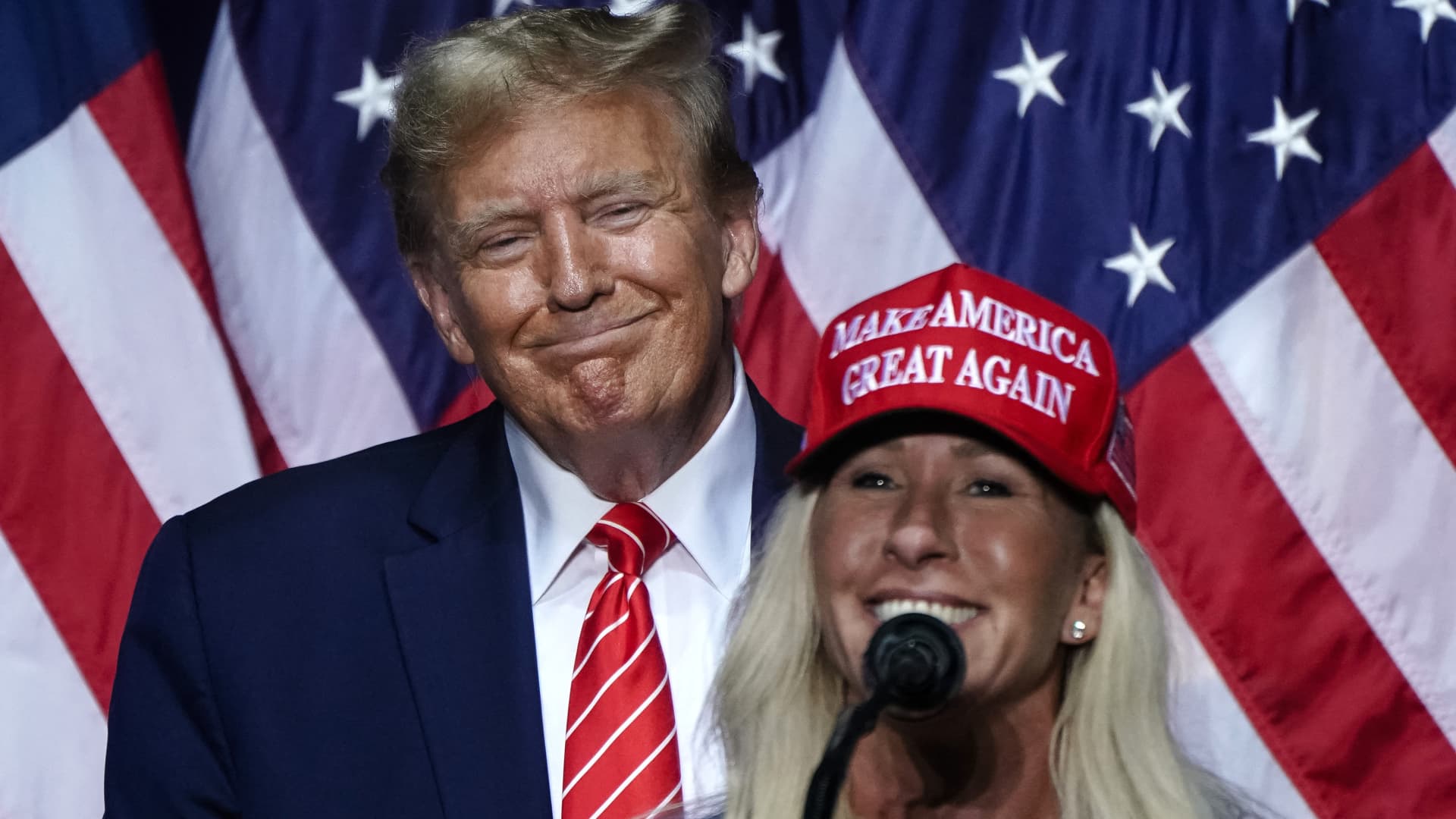US Representative Marjorie Taylor Greene (R) speaks alongside former US President and 2024 presidential hopeful Donald Trump at a campaign event in Rome, Georgia, on March 9, 2024.
Elijah Nouvelage | AFP | Getty Images
A media company with ties to former President Donald Trump is off to a rocky start with share prices tanking and the company’s value diminishing by the day.
Rep. Marjorie Taylor Greene, R-Ga., doesn’t seem eager to discuss the struggling business, years after she purchased shares in a company that helped Trump’s business go public on the Nasdaq.
Asked by CNBC and NBC News, Greene wouldn’t say what happened to her stock in Digital World Acquisition Corp., which, through a merger with Trump Media, recently started publicly trading as DJT. The share price is down at least 45% month to date.
Trump Media is the parent company of the former president’s social media app, Truth Social. Shareholders of DWAC voted to approve the merger with Trump Media in order to take the company public on March 22, with the company debuting on the Nasdaq on March 26.
Greene is one of two members of Congress who disclosed buying shares in Digital World Acquisition Corp. She and Rep. Larry Bucshon, R-Ind., each bought stock in the company in October 2021, according to financial disclosure reports, the same month the company announced it had completed a deal with Trump Media to merge the two entities, with the goal of the Trump business publicly trading on the stock market.
Greene bought shares of DWAC on Oct. 22, 2021, just days after the merger announcement, in an amount ranging from $15,000 to $50,000, according to her official congressional financial disclosure filings. The DWAC stock opened up trading that day at $118.80 and finished around $67.
Bucshon bought DWAC stock on Oct. 25, 2021, for anywhere between $1,000 and $15,000, according to a financial disclosure. DWAC’s stock closed the day at around $83.
If either of the two lawmakers are still investors with DWAC now, they could have lost thousands — up to $32,500 in Greene’s case — according to Chris Josephs, the co-founder of stock trading app Autopilot. Josephs noted that Bucshon could have lost up to $8,900 with the stock price tanking.
A spokesman for Bucshon confirmed to CNBC and NBC News that the Indiana lawmaker still owns stock in the now-merged media company despite the dipping stock price.
“Congressman Bucshon has taken no further action regarding his investment in DWAC since its initial purchase in October 2021, and he has fully complied with all disclosure requirements required under federal law related to that trade,” the spokesman said in a statement.
He did not return follow-up questions on why Bucshon continued to hold the stock, which closed at $32 on Thursday, marking a 54% drop in share price since the stock debuted on the Nasdaq in March. The company has also erased all of its gains since shares began trading under the DJT ticker at $70.90.
Bucshon’s most recent annual financial disclosure shows he entered 2023 with DWAC stock valued in the range of $1,001 to $15,000.
But Greene would not say what’s happened to her stock since her original purchase and her public disclosures have not shown that she sold DWAC or Trump media stock, according to documents archived by LegiStorm, raising questions among ethics lawyers about what happened to Greene’s stock.
When asked about the status of her DWAC stock, Greene spokesman Nick Dyer said in an e-mail that Greene “holds no stocks at this time as reflected in her financial disclosure.”
He did not return follow-up requests for comment about what happened to her shares in the company.
Greene also would not say when asked by NBC News on Wednesday what happened to her Trump Media stock. “This is a waste of time. I think you can read my reports and see what I own,” she said.
“Where is her stock at?” Richard Painter, a former George W. Bush White House ethics lawyer, said in a phone interview.
He and other ethics lawyers offered a few potential reasons why Greene wouldn’t have included the stock on her recent disclosures.
If she still owns DWAC stock and the estimated value of the asset went below $1,000, it would not be required to be disclosed, according to Campaign Legal Center general counsel Kedric Payne.
Another plausible scenario is Greene sold her stock recently. In that case, she wouldn’t have to disclose the sale for up to 45 days, according to Painter. She also could have lost the asset during her 2022 divorce proceedings with her then-husband, Painter said, noting that if the stock was given away through a divorce settlement, it may not be considered an asset transaction. Greene finalized her divorce in December 2022, according to Business Insider.
“She’s got to explain what the heck happened,” Painter explained.
Lawmakers aren’t prohibited from trading or holding individual stocks and other investments. But under the STOCK Act, members of Congress must report any trades within 45 days.
Some members of Congress and outside groups have long argued that members of Congress should not be allowed to trade stock while serving as elected officials. But legislation that would ban them from trading individual stocks has languished in Congress.
— NBC News’ Scott Wong contributed to this story.







